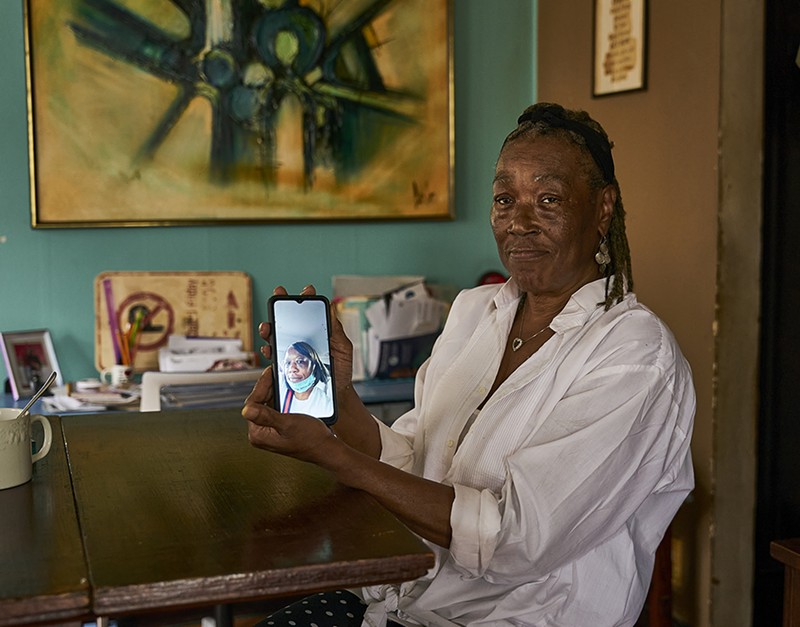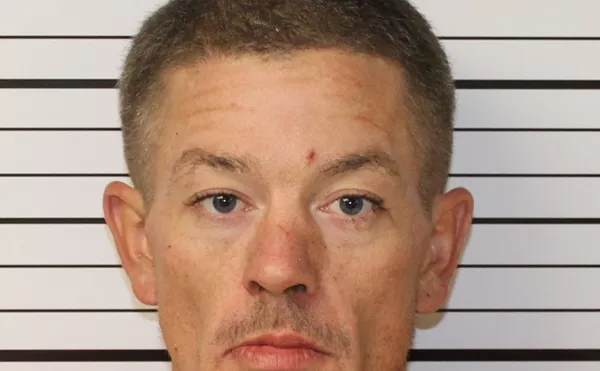Death ends a life but not a relationship.
So it goes with Carolyn Reed, who's still sifting through the events of the last 10 months to process her daughter Chuny Ann Reed's complex life — and death.
Chuny Ann Reed, 47, was addicted for many years to heroin. And to support her addiction, she sold crack cocaine out of her top-floor apartment at the Parkview Apartments, in the heart of the Central West End neighborhood.
Then, in early February, everything blew apart. Federal authorities arrested and charged Reed for her role in the worst mass drug overdose in St. Louis history.
Eleven people overdosed — eight fatally — after ingesting crack cocaine that Reed allegedly had sold them. The cocaine was tainted with fentanyl, a synthetic opioid 100 times more powerful than morphine.
Five months later, Reed herself was dead, the victim of a rare and undetected medical condition.
Carolyn Reed said she had long known about her daughter's problems with drug addiction and had warned her many times to get help.
"With her being a drug addict, anything could happen," she says. "She'd always been told, 'You living this life, you know what comes with this life. You got to deal with the consequences when it comes.'"
Officially, at least, the case is closed on Chuny Ann Reed's death: She died from an untreated aortic tumor that obstructed an external carotid artery, blocking the flow of blood to her brain.
That's according to the coroner's report based on the autopsy performed on her soon after her death.
At the time of her death, on July 18, Reed was awaiting trial at the Tri-County Detention Center, in Ullin, Illinois, located about 150 miles southeast of St. Louis.
But is the coroner's report — obtained by the RFT under the Illinois Freedom of Information Act — telling the full story?
Not according to Donisha Blount, 30, the second of Reed's three daughters.
Soon after her mother's collapse at Tri-County and subsequent transport to a Mount Vernon hospital, Blount says she received a message on Facebook from a woman who said her best friend was Reed's cellmate and had witnessed what happened when Reed collapsed in a hallway leading to the jail infirmary.
Blount later spoke on the phone to the cellmate, who identified herself as Chrissy Watts, Blount says.
Watts told her that on July 16 Reed collapsed from an apparent heart attack.
Blount says Watts told her she was calling for the guards. "She had a heart attack; she had a heart attack. And nobody came."
Watts estimated that Reed was lying on the hallway floor for about 20 minutes before jail personnel came to her aid.
"And when they did come, they had her in the infirmary for four hours before they got her to a hospital," Blount says Watts told her. "And that's crucial, especially when you're dealing with the lack of oxygen to the brain. All it takes is seven minutes before it's critical."
The RFT could not independently verify if Watts was an inmate at the Tri-County Detention Center at the time of Reed's death.
The Parkview mass overdose event was the subject of a Riverfront Times cover story, whose print edition in mid-July appeared the day Reed collapsed in the jail.
Reed had been charged with "distribution of cocaine base and fentanyl" and had faced at least 20 years in prison if she'd been convicted, according to court papers.
Dr. Christopher J. Kiefer, a forensic pathologist based in Madisonville, Kentucky, conducted the postmortem examination of Reed's corpse on July 24. He submitted his report to Roger Hayse, the Jefferson County, Illinois, coroner, on November 3, the report shows.
Kiefer's report did not show the presence of drugs in Reed's system at the time of her death but noted a history of heroin use. Blount acknowledged her mother was a persistent user of heroin and other opioids throughout her life.
Jail authorities also knew of her history of drug addiction and other medical problems but denied her access to decent medical care, Carolyn Reed said.
"But she had a medical problem everybody ignored on the day of her death," she says. "That's the catch right there. She's going to seek medical help. You all denied her medical help."
Kiefer's report notes that Chuny Ann Reed had a "history of seizure and death after stroke-like symptoms" and that she suffered from "hypertensive cardiovascular disease."
Watts, the cellmate, told Blount that each morning she joined a long line of jail inmates receiving medications for health conditions such as diabetes. Despite Reed's long history of hypertension, strokes and seizures, "'I never see your momma going over there to join the meds line,'" Blount says Watts told her.
The question as to whether Reed was getting adequate care in detention is still up for debate, and may not be answered. The Illinois State Police criminal investigation unit began looking into Reed's death a few days after she died.
Neil Laster, an Illinois State Police special agent leading the criminal probe, says the case will remain open for a year after it was initially launched.
"There is no foul play suspected," Laster says. "This case is going to stay open for a year. We do that as standard. All our death investigations are like that, regardless."
Laster says Illinois State Police investigators interviewed jail inmates who were there the same time as Reed was, but he declined to elaborate.
"I'm not going to discuss any specifics of the investigation, just the fact we interviewed inmates as well," Laster says.
Neither jail officials nor the U.S. Marshals Service did anything to inform Reed's family about her death. The only updates Blount says her family received on her mother's medical condition and cause of death was from an RFT writer, Blount says.
Reed never received professional help for her drug problems, which began when she was 17.
"She just decided she didn't want to do it," Carolyn Reed says about her daughter, who would tell others not to worry about her drug addiction, assuring family she had it under control. "As kids do."
Reed describes her late daughter as "very positive. She had a bubbly attitude. Always grinning and laughing and cracking a joke."
But the upbeat demeanor masked a world of deep pain, Carolyn Reed says.
"She had daddy issues," she says, referring to Chuny Ann's father, a career military man.
Her father rejected her because "she wasn't good enough, or she wasn't doing the things he wanted her to do," Carolyn Reed says.
More than 10 months have passed since the drug overdose that killed eight people, but so far law enforcement agents have not spoken to Carolyn Reed, she says.
"They ain't talked to me, and I ain't called them," she says.
Chuny Ann Reed's death is really hard for her 19-year-old daughter Emily, who suffers from severe cerebral palsy, is non-verbal and is confined to a wheelchair, says Blount, who cares for Emily, her baby sister.
"So imagine one day [our mom is] here, and now she's not," Donisha Blount says. "It's really hard for her to understand these things."
Mike Fitzgerald can be reached at [email protected].
This project was completed with the support of a grant from Columbia University's Ira A. Lipman Center for Journalism and Civil and Human Rights in conjunction with Arnold Ventures.Coming soon: Riverfront Times Daily newsletter. We’ll send you a handful of interesting St. Louis stories every morning. Subscribe now to not miss a thing.
Follow us: Google News | NewsBreak | Reddit | Instagram | Facebook | Twitter






